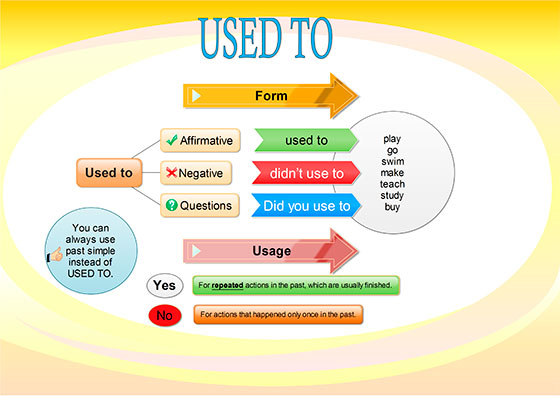“Would, used to, be + always + -ing”
“Would, used to, be + always + -ing”

Introducción
Se usan "used to" y "would" para describir los hábitos o cosas que eran verdad o ciertas en el pasado pero que ya no ocurren o no son verdad en el presente.- Se puede usar "used to" o "would" para describir las acciones repetidas en el pasado
- Sólo se usa "used to" para cosas ciertas en el pasado.
Ejemplos:
"used to" o "would"
- I used to get up at 6am to go to school.
- I would get up at 6am to go to school.
- I used to live in France. not I
wouldlive in France. - I used to have a pet rabbit. not I
wouldhave a pet rabbit.
Son verdades del pasado
"used to" vs. "would"
Compare las siguientes frases:
- I used to / would go camping when I was young.
"go" describe una acción repetida.
- I used to love camping when I was young.
"love" describe una verdad/realidad.
Forma 1 - used to

| Afirmativo | I / You / We / They He / She / It | used to | like | chocolate. |
| Negativo | didn't use to did not use to | |||
| interrogativo | Did | I / you / we / they he / she / it | use to | like | chocolate? |
Práctica
Complete las frases con la forma afirmativa, negativa o interrogativa de "used to" usando el verbo entre paréntesis:
Forma 2 - would

| Afirmativo | I / You / We / They He / She / It | would | eat | chocolate. |
| Negativo | wouldn't would not | |||
| interrogativo | Would | I / you / we / they he / she / it | eat | chocolate? |
I’d / you’d / we’d / they’d / she’d / he’d / it’d
Práctica
Complete las frases con la forma afirmativa, negativa o interrogativa de "would" con el verbo entre paréntesis:
Comentarios
Publicar un comentario